
-
 China's women e-sports players defy sexism for love of the game
China's women e-sports players defy sexism for love of the game
-
Tech sector's energy transition draws attention at Vegas show
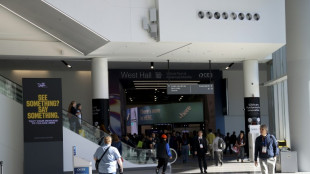
-
 Five things to know about New Glenn, Blue Origin's new rocket
Five things to know about New Glenn, Blue Origin's new rocket
-
Blue Origin set for first launch of giant New Glenn rocket

-
 Dutch police detain hundreds at climate protest
Dutch police detain hundreds at climate protest
-
Germany battles to secure stricken 'Russian shadow fleet' oil tanker

-
 Malala Yousafzai 'overwhelmed and happy' to be back in Pakistan
Malala Yousafzai 'overwhelmed and happy' to be back in Pakistan
-
'Education apartheid': schooling in crisis in Pakistan

-
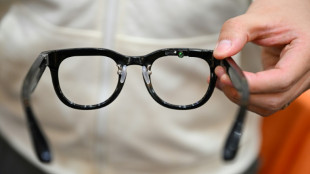 Smart glasses enter new era with sleeker designs, lower prices
Smart glasses enter new era with sleeker designs, lower prices
-
Supreme Court looks poised to uphold TikTok ban

-
 2024 hottest recorded year, crossed global warming limit
2024 hottest recorded year, crossed global warming limit
-
Germany reports foot-and-mouth disease in water buffalo
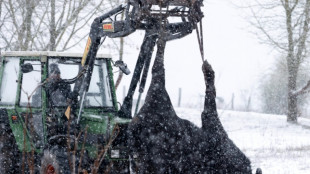
-
 US hikes reward for Maduro arrest after 'illegitimate' swearing-in
US hikes reward for Maduro arrest after 'illegitimate' swearing-in
-
Robots set to move beyond factory as AI advances

-
 Pro-Russian disinformation makes its Bluesky debut
Pro-Russian disinformation makes its Bluesky debut
-
UK gas reserves 'concerningly low', warns biggest supplier

-
 2024 warmest year on record for mainland US: agency
2024 warmest year on record for mainland US: agency
-
Meta policy reversal puts question mark on future of fact-checking

-
 Meta policy reversal puts question mark on furure of fact-checking
Meta policy reversal puts question mark on furure of fact-checking
-
Strong US jobs report sends stocks sliding, dollar rising

-
 US hiring beats expectations in December to cap solid year
US hiring beats expectations in December to cap solid year
-
UK gas reserves 'concerningly low': Biggest supplier

-
 Global stocks mostly fall before US jobs data
Global stocks mostly fall before US jobs data
-
Ubisoft: the 'Assassin's Creed' maker targeted by suitors

-
 Stock markets drift lower as US jobs data looms
Stock markets drift lower as US jobs data looms
-
Pakistan flight departs for Paris after EU ban lifted

-
 Nobel laureate Malala Yousafzai to visit native Pakistan for girls' summit
Nobel laureate Malala Yousafzai to visit native Pakistan for girls' summit
-
AI comes down from the cloud as chips get smarter

-
 Tajikistan bets on giant dam to solve electricity crisis
Tajikistan bets on giant dam to solve electricity crisis
-
Uruguay bucks 2024 global warming trend

-
 Last 2 years crossed 1.5C global warming limit: EU monitor
Last 2 years crossed 1.5C global warming limit: EU monitor
-
Japan 'poop master' gives back to nature

-
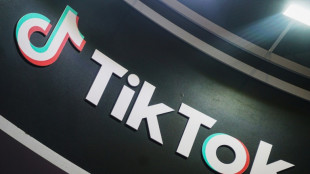 US Supreme Court to hear TikTok ban case
US Supreme Court to hear TikTok ban case
-
US Fed's December rate cut should be its last for now: official

-
 Paris Hilton among celebrities to lose homes in LA fires
Paris Hilton among celebrities to lose homes in LA fires
-
Airbus boosts plane deliveries in 2024

-
 Ubisoft reviews restructuring options, postpones new Assassin's Creed
Ubisoft reviews restructuring options, postpones new Assassin's Creed
-
Lamborghini sets new sales record amidst hybrid push

-
 Lebanon army chief Aoun becomes president after two-year vacancy
Lebanon army chief Aoun becomes president after two-year vacancy
-
US emissions stagnated in 2024, challenging climate goals: study

-
 Lebanon army chief short of required majority in first round of president vote
Lebanon army chief short of required majority in first round of president vote
-
Global stock markets mixed tracking US rates outlook

-
 Lebanon meets to finally elect president after two-year vacancy
Lebanon meets to finally elect president after two-year vacancy
-
Celebrities flee Los Angeles fires, lose houses as Hollywood events scrapped

-
 Japan startup hopeful ahead of second moon launch
Japan startup hopeful ahead of second moon launch
-
Ukraine allies to hold last defence meet before Trump takes office

-
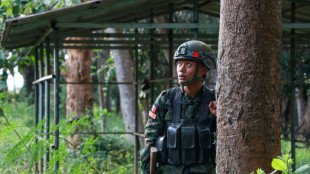 Myanmar military adopts anti-junta fighters' drone tactics
Myanmar military adopts anti-junta fighters' drone tactics
-
CES tech looks to help world's aging population

-
 Rubber tappers forge sustainable future in Amazon
Rubber tappers forge sustainable future in Amazon
-
US astronauts upbeat seven months into eight-day mission

| RELX | -0.86% | 46.37 | $ | |
| RIO | 0.36% | 58.84 | $ | |
| RBGPF | 100% | 60.49 | $ | |
| BTI | -2.34% | 35.9 | $ | |
| BP | 0.54% | 31.29 | $ | |
| GSK | -1.99% | 33.09 | $ | |
| SCS | -3.01% | 10.97 | $ | |
| AZN | 0.64% | 67.01 | $ | |
| NGG | -3.3% | 56.13 | $ | |
| CMSC | -0.79% | 22.92 | $ | |
| BCC | -1.31% | 115.88 | $ | |
| RYCEF | -0.42% | 7.07 | $ | |
| BCE | -2.92% | 22.96 | $ | |
| VOD | -1.99% | 8.05 | $ | |
| JRI | -1.16% | 12.08 | $ | |
| CMSD | -0.65% | 23.25 | $ |

'We don't feel safe': Serbians lash out after fatal roof collapse
For years, Serbia's leaders boasted of launching a building spree across the country that had touched off a new era of prosperity in the Balkan country.
But following the deaths of 14 people after a roof collapsed at a train last week, a new tide of anger has been unleashed at authorities. That public ire has largely focused on reports of alleged short cuts made with building projects, reports that have left many with a new sense of vulnerability.
On Tuesday evening, more than 20,000 protestors rallied in the city of Novi Sad outside the train station where the fatal incident occurred. Many in the crowd chanted "Prison, prison!" while waving signs that read: "How many more dead children?"
"We've been unhappy as a people for a very long time," Djordje Mitrovic, 30, told AFP at the rally. "We don't live well. We don't feel well... And now we don't feel safe either."
Amid mounting public pressure, the country's Construction Minister Goran Vesic resigned Tuesday, citing his ministry's oversight of development projects.
Vesic refused, however, to "accept the guilt for the deaths of 14 people".
The central railway station in Novi Sad underwent three years of renovation that was completed in July, though Serbia Railways said the collapsed outdoor roof had not been part of that work.
The construction was handled by a Chinese consortium comprising China Railway International Co. Ltd and China Communications Construction Company Ltd.
The authorities have vowed to investigate.
- 'Land of cranes' -
After years of war in 1990s followed by attempts to kickstart Serbia's economy, the Serbian Progressive Party led by President Aleksandar Vucic was elected into office more than a decade ago, promising a new era of stability in the country.
In the decade that followed, the promised renewal was most visible in the string of projects Vucic and the party launched across the country -- including bridges, roads and a massive waterfront development in the capital Belgrade.
Vucic often boasted of transforming Serbia into "a land of cranes".
But following the fatal accident in Novi Sad, analysts have warned that Vucic's political trump card is now at risk of turning into a liability.
"When a part of a building that stood for 50 years collapses shortly after renovations, the safety of newly constructed, extended, and restored public structures becomes a matter of common sense," sociologist Dario Hajric told AFP.
After the roof's collapse, people have taken to both streets and social media questioning the safety of several new projects set to open in the coming years -- including an underground metro network and bridge in Belgrade.
"Today, as we walk around the city, we have to consider whether something might fall on our heads," opposition figure Stevan Babic told reporters.
"It is a direct result of corruption, rigged tenders, and crony connections," added Ana Oreg, a member of parliament and Novi Sad resident.
- 'Accountability' -
Vucic visited Novi Sad late Tuesday shortly after the protest, insisting that the government has taken all necessary steps to punish those responsible for the railway station tragedy.
"No one will escape accountability if they made a mistake," Vucic vowed.
Since the accident, prosecutors in Novi Sad have questioned over 50 individuals, including Vesic and officials from Serbian Railways.
The prosecutor's office has also gathered documents as part of its investigation into what caused the disaster and who might be responsible.
Ultimately however, the transparency of the probe may serve as the true litmus test when it comes to regaining public trust.
In findings published earlier this year, Transparency International warned that Serbia was "witnessing a democratic decline, with its autocratic government using special laws to limit transparency in large-scale projects".
Many observers are worried that officials will now duck responsiblity for the train station accident.
"The authorities don't need the truth but rather a version of reality in which they bear no blame," said the sociologist, Hajric.
A.Samuel--CPN
